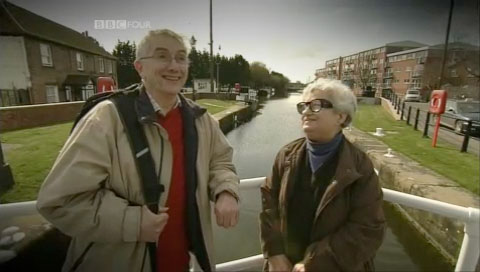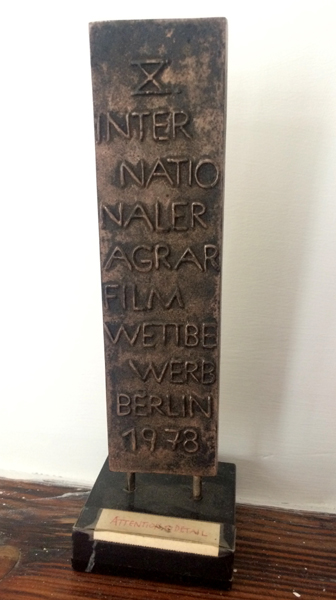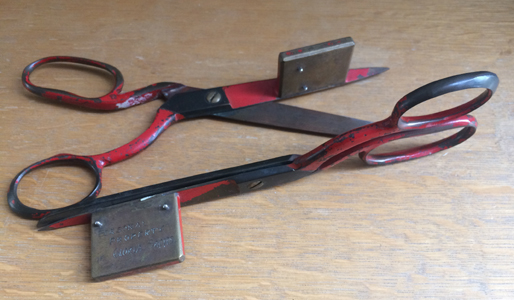GLORIA SACHS
Documentary film director
Gloria Sachs (1928-2019) was a documentary film director, who worked for British Transport Films between 1958 and 1977. |
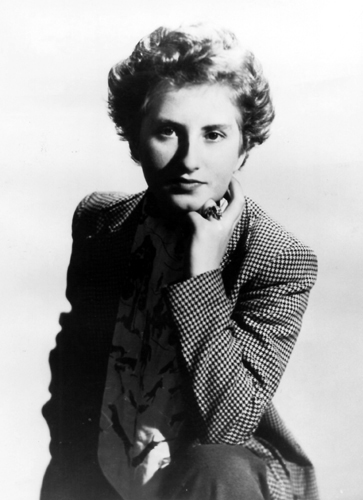 |
|
British Transport Films British Transport Films was formed in May 1949 with Edgar Anstey as its first Producer in Charge. ... The unit's production arm functioned from 1949 until 1982. ... The main purpose of the unit was to provide films that would stimulate travel ... . Gloria Sachs worked for BTF during the middle years of its existence and was one of its few women directors. In 1990, Gloria Sachs interviewed Margaret Thomson (1910-2005), a prolific and successful documentary film director, for the British Entertainment History Project. In the interview, Margaret Thomson says that, as a woman, 'you couldn't be the director of a feature film unless you had a very powerful personality, or very great skill'. Gloria comments that: 'you couldn't be the director of a documentary film with any great ease either'. Production Assistant, Assistant Editor and Editor Gloria Sachs's first credit is as production assistant on Groundwork for Progress (1958), which was was directed and written Bill Mason, with executive producer Edgar Anstey, producer Stewart McAllister, editor Cynthia Barkley, music by David Wooldridge, and photography by Ron Bicker and David Watkin. This film describes the work done by civil engineers in laying railway lines, testing track and testing bridges Work. In 1959, Gloria Sachs worked as an assistant editor under editor Terry Trench on two films. Under The River (1959), about the construction of the Severn tunnel and the Cornish beam engines that keep it pumped dry, was directed and written by RK Neilson Baxter, edited by Cynthia Barkley and Terry Trench, with photography by Ron Bicker, David Watkin and Trevor Roe. Gloria Sachs commented about Terry Trench that 'you could give some editors lots of good stuff and they would make a rubbish film, but with Terry you could give him rubbish stuff and he would always turn it into a good film'. The second film on which Gloria Sachs worked with Terry Trench was Three is Company (1959). The film shows three American tourists visiting Britain. It was directed by Tony Thompson, edited by Terry Trench, with music by Elisabeth Lutyens. Three is Company won Best Publicity Film in Rome in 1960 and a Diploma of Merit in Melbourne in 1964. Ian Woolf recalls that: 'Gloria took me on as her cutting-room trainee at British Transport Films. Both of us working for Terry Trench. It was almost a case of 'good cop/bad cop'. Terry invariably cheerful and deceptively casual about the way he would throw bits of film at me to file or join. Gloria - a bit fierce sometimes about getting me to follow the proper cutting-room procedures. It was the best way to learn the job. Almost as important, Gloria enabled me stay in my job. She was a strong union (ACT) member; it took some time but she finally negotiated my Union membership.' Gloria Sachs edited Off The Beaten Track (1960). This 17-minute film, about youth hostellers travelling by train, was directed by Syd Sharples, with producer Edgar Anstey, executive producer Edgar Anstey, associate producers John Legard and Ian Ferguson, music by Elisabeth Lutyens, and photography by Ron Bicker, Jack West and Phil Law. Off The Beaten Track was reviewed rather half-heartedly in Monthly Film Bulletin (July 1961, page 103): 'Though touching upon the part played by railways in catering for trippers, and allowing for some well chosen and photographed shots of beauty spots, this short is mainly concerned with the facilities provided by Youth Hostels all over the country. The subject is agreeably if unremarkably handled in all its aspects.' Gloria Sachs also edited On Wheels and Waves (1960). This film, about a trip by coach from Norwich to Calais and back, was produced by Edgar Anstey, with photography by David Watkin. It was sponsored by Tillings Group. Director and writer Gloria Sachs's directorial debut was Travelling Sixties (1960), which she both wrote and directed. The film tells of a package holiday for 300 senior citizens by special train, ferry and coach to the Isle of Wight. It was produced by Edgar Anstey, with photography Ronald Craigen, and the commentary spoken by Duncan Carse. Watch the whole film on BFI Player: Travelling Sixties |
 |
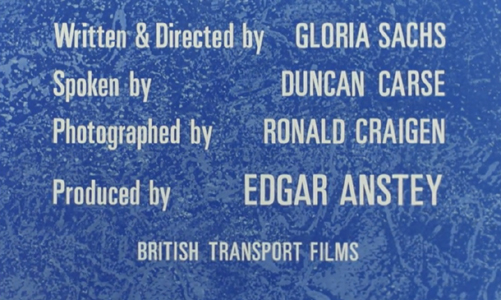 |
|
In 1965, Gloria Sachs directed and edited Hostellers. This film was produced by Edgar Anstey, with music by Bill Le Sage, and photography by Jack West. The sponsor was the British Railways Board. Hostellers is about Sabrina, a barge in Selby, Yorkshire, which is also a youth hostel, and two young men (Brian Cotton and Ken Moody), keen hostellers who help set up and run the hostel on the barge. They express their views on youth hostelling, and challenge the older generation who are running the Youth Hostelling Association; the film was controversial in the youth hostelling world. Hostellers received a Selection Certificate at the film festival in Edinburgh in 1966. Watch the whole film on BFI Player: Hostellers. |

|
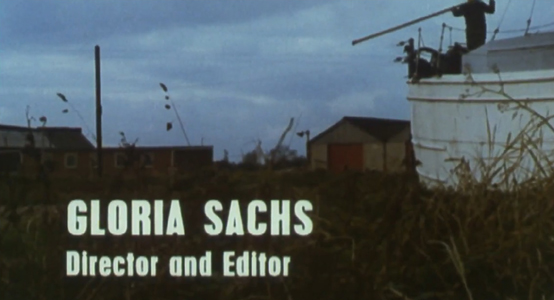 |
|
Director and producer Andrew Knight made a BBC4 documentary some forty-four years later, Youth Hostelling: The First 100 Years (2009, True North Productions), in which Gloria Sachs is reunited with Ken Moody and they are both interviewed about Hostellers. Commentator Barbara Flynn remarks that: 'After filming the sequence on Sabrina, Gloria's film widened out to become something that challenged the YHA to its very core. An uncensored vehicle for the views of the 60s generation with Ken and a friend Brian Cotton travelling around the hostels in Britain free to say whatever they felt.' Gloria Sachs commented that: 'I was very bored with commentary talking about the things you could see on the screen anyway. I found it very boring and I wanted something that was more free and real. We did interviews with them and from those interviews we edited the verbiage and built the film around it.' |
|
Gloria Sachs returned to editing for Freight and a City (1966), which was directed by Bill Mason, produced by John Shearman, with Edgar Anstey as producer in charge, and photography by Trevor Roe, Ernest Xerri and Gordon Clarke. The sponsor was the British Railways Board (uncredited). Gloria Sachs directed The Site in the Sea (1970), which was produced by Edgar Anstey, with a script by associate producer Jack Howells, music by Edward Williams, and photography by Ronald Craigen. The sponsors were the British Transport Docks Board and British Steel Corporation. This 35-minute film depicts the construction of a new tidal deep-water harbour in Port Talbot large enough to take bigger ships bringing iron ore to the steel works. Watch the whole film on BFI Player: The Site in the Sea. BFI Player remarks that: 'Though directed by a woman, Gloria Sachs, the only other prominent females in this film are a dredger and two ships. It's an ambitious production, with its idealistic tone matched by lyrical music composed by Edward Williams.' |
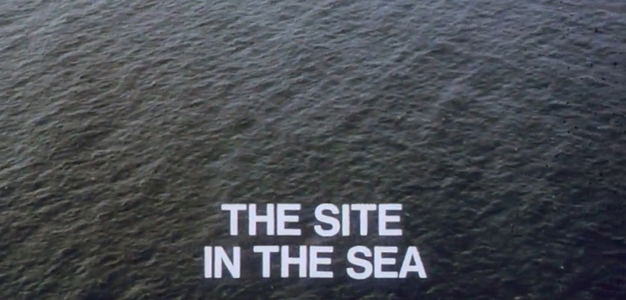 |
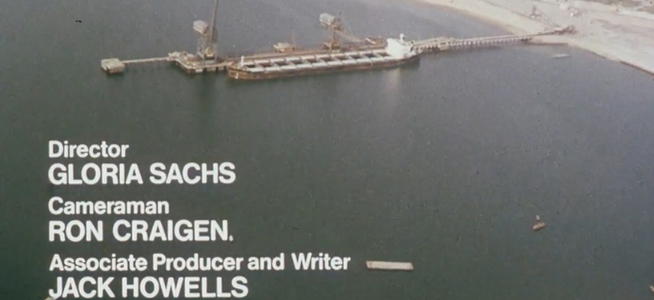 |
|
In 1977, Gloria Sachs directed Attention to Detail (1977), with a commentary written by Gloria Sachs and John Riley, photography by Peter Bloomfield, and the commentary spoken by Carl Duering (most famous as Dr Brodsky in Stanley Kubrick's A Clockwork Orange). The production company and sponsor was the Ministry of Agriculture. Attention to Detail won a prize at the 1978 International Agricultural Film Competition in Berlin. |
|
British Entertainment History Project Gloria Sachs interviewed a number of eminent documentary film-makers for the British Entertainment History Project (formerly BECTU History Project): Kitty Marshall, Daphne Anstey, Margaret Thomson, Miriam Maisel, Martin Smith, Geoff Hermges, Godfrey Jennison, John Taylor, Erica Masters, and Bessie Bond. Unfortunately, no one interviewed Gloria Sachs herself. Gloria Sachs Gloria Sachs was a film director at a time when it was not the norm for women. The film of which she was most proud from her twenty-year career with British Transport Films was Hostellers. This is a film which demonstrates her willingness to challenge the conventions of documentary film-making at the same time as maintaining her usual high standards of care and precision. |
|
Cally Trench, 2019 Thank you to: |
